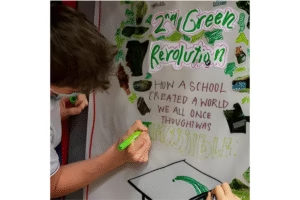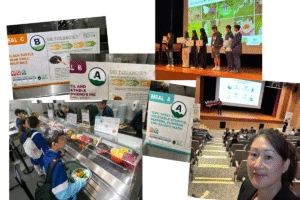How Chinese International School is Cultivating the Next Generation of Sustainability Leaders
In this Future Green podcast, Heidi sat down with three key figures from CIS: Jerry Szombathy, Director of Operations; Nadina Schneider, Sustainability Integrator for the Upper School; and Monica Lo, Sustainability Integrator for the Primary Division.
Together, they shared how the school is embedding sustainability across operations, education and community engagement.
Want the full story, straight from the source?
🎧 Listen to the full podcast interview here with Heidi
Chinese International School (CIS) in Hong Kong has long been recognised as one of the region’s most forward-thinking educational institutions. A vital part of the school’s 10-year strategic plan focuses on its Sustainability Pledge, which is a key initiative on the path to excellence. Sustainability is not a standalone project at CIS; it is a shared value that runs through every aspect of school life.
As a long-time Future Green partner and member, CIS has consistently demonstrated leadership in sustainability — from reimagining food systems on campus to hosting its own student-led Biodiversity Summit, which brings together schools, experts and changemakers to explore our relationship with nature.

Source: CIS – Students designing their “2nd Green Revolution” project — a creative call for reimagining a sustainable future.
Building a Strategy for Long-Term Impact
For CIS, sustainability is not an afterthought but a strategic priority.
This clarity of purpose has been crucial. By embedding sustainability into its long-term strategy, CIS ensures that environmental responsibility is treated with the same seriousness as any other school goal. Dedicated roles like Nadina’s and Monica’s give the work structure, accountability and momentum, rather than relying solely on voluntary efforts.
Empowering Students Through Learning and Action
Both Nadina and Monica work to embed sustainability and systems thinking throughout the curriculum. Monica explained how even the youngest learners are encouraged to think critically about their choices.
Source: CIS – Primary students explore sustainability in action during an Earth Day classroom session.
In the primary years, students explore real-world problems such as designing typhoon-resistant dwellings or understanding how materials break down in nature. Their “Green Team” drives campus initiatives to make the school greener, cultivating a sense of ownership and pride in environmental stewardship.
The Biodiversity Summit: Learning Beyond the Classroom
The CIS Biodiversity Summit, now in its third year, is one of the school’s most inspiring student-led initiatives. The event gathers pupils, educators and organisations such as WWF, Rooftop Republic and Kadoorie Farm to explore the importance of biodiversity and its connection to food, water and climate.
Nadina shared how the summit evolved:

Heidi showcasing biodiverse ingredients at the CIS Biodiversity Summit, students and partners celebrate a plant-forward carbon labelled menu inspired by WWF’s Future 50 Foods.
The summit also showcased sustainable food innovation through a plant-forward lunch, co-created with CIS’s catering partner Sodexo, and with input from TASS, a regional school alliance. Students enjoyed diverse, flavourful dishes made from ingredients inspired by WWF’s “Future 50 Foods”, proving that sustainability can be both educational and delicious.
Rethinking Food Systems
With over 2,000 people on campus each day, all needing to eat, CIS recognises the power of food as a gateway to sustainability. Working closely with Sodexo, the school has transformed its catering approach — from ingredient sourcing to waste management.
This practical, hands-on approach enables students to see the entire lifecycle of food, from soil to plate — and back again.

Source: CIS – On-site composter turns food waste into rich soil — a hands-on lesson in circular food systems.
Tracking Progress and Looking Ahead
CIS continues to lead with data-driven action. The school now tracks its waste and recycling streams monthly, using this information to raise awareness and inspire individual responsibility.
Looking ahead, CIS is setting its sights on achieving zero waste and embedding sustainability within the design of its new primary campus extension, currently in the planning stages. The school is working with environmental consultants to ensure that the new site reflects the same forward-thinking principles that define CIS today.
One Step at a Time
For Monica, the path to sustainability is about balance and optimism.
That spirit of steady, collective progress perfectly captures CIS’s approach. By combining strategic leadership, innovative teaching and empowered students, Chinese International School is showing what’s possible when a community works together towards a sustainable future.
Want to Take Action in Your Organisation?
CIS’s sustainability progress didn’t happen by chance — it’s been strengthened by collaboration, training and a shared commitment to continuous learning.
Notably, Jerry Szombathy, CIS’s Director of Operations, is a graduate of Future Green’s CPD Certified Food Sustainability Foundations Course and Carbon Literacy Training, both of which have helped the school translate sustainability strategy into practical, measurable action.

Jerry Szombathy, Director of Operations at CIS, shares how our Food Sustainability Foundations course has helped his sustainability journey.
If your organisation is ready to take the next step towards building a more sustainable future, get the know-how with us through:
👉 Get your membership and start making an impact!
👉 CPD Certified Food Sustainability Foundations Course (included with your membership)
📅 Book a discovery call to learn how Future Green membership can support you.
👉 Carbon Literacy Training
🌿 Learn more about Chinese International School’s sustainability journey on their website.

